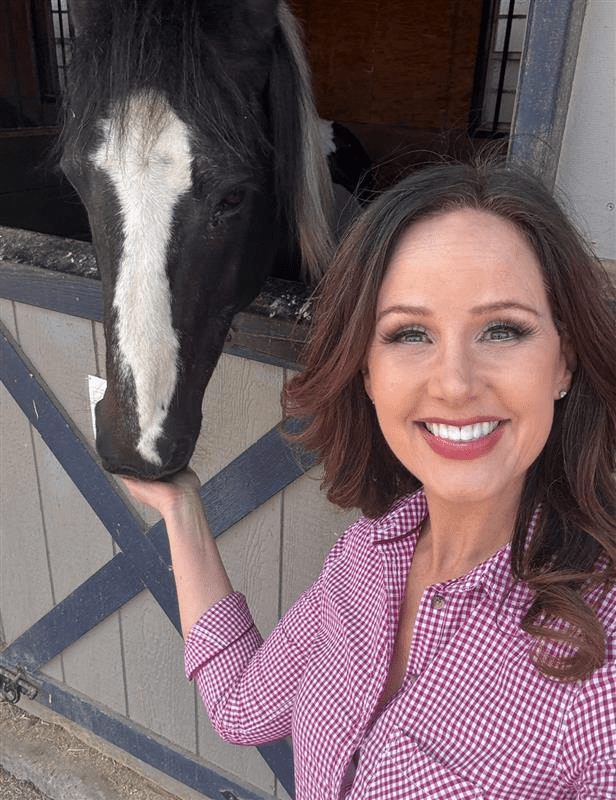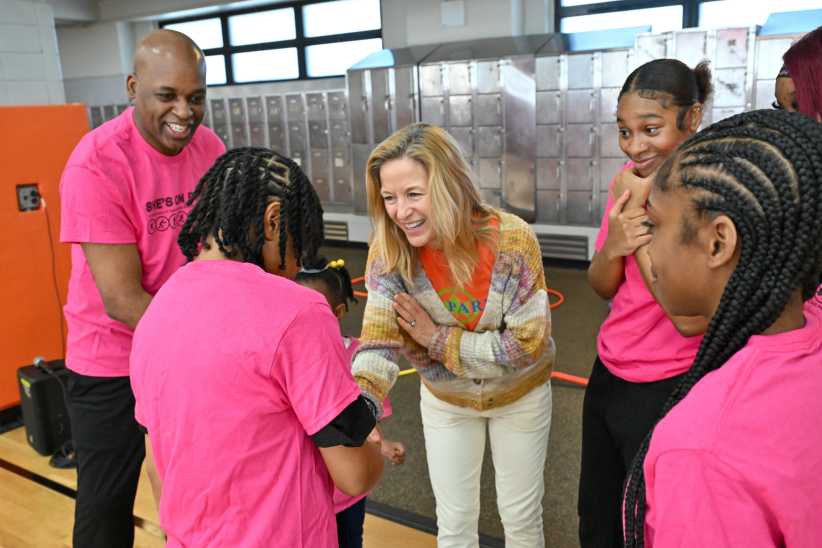Few people in the country have done more to advance the cause of music education than Wynton Marsalis. The legendary trumpeter, who has recorded more than 60 jazz and classical albums and accumulated nine Grammys over the course of his career, has taught and played with thousands of school bands, advocated for arts programs in front of Congress and even helped lead a “Jazz Studio” workshop for young people at the White House this year. But the Louisiana-born artist, who has lived in New York since 1979, is also keeping it local. As cofounder and artistic director of Jazz at Lincoln Center, Marsalis has helped create jazz education programs for New Yorkers as young as 18 months. Through the popular “Jazz For Young People” concerts, he introduces little ears to the likes of Thelonious Monk and Mary Lou Williams. All this in addition to directing and touring with the world-renowned Jazz At Lincoln Center Orchestra and writing more than 20 major musical compositions. Recently, Marsalis sat down with New York Family at Jazz at Lincoln Center’s late-night jazz club, Dizzy’s Club Coca-Cola, for some New Orleans-style soul food—and to recount how he first connected to the music that is now his life’s passion. But the way he lit up when he spoke about his four children made it clear that jazz music isn’t the proud father’s only love.
As the son of jazz musician Ellis Marsalis,
you grew up in a family with a rich musical heritage. How and when did
you first connect to jazz?
I didn’t like jazz at first. I liked the stuff that
was on the radio: Motown, James Brown, Marvin Gaye, Kool & the Gang,
the kind of music the neighborhood liked. But I liked being around the
jazz musicians; I liked the way they talked. And so when I got to be 12,
I started listening to the music—John Coltrane, Miles Davis. I started
to understand the difference between jazz music and pop music. But the
world of jazz was very small. My friends and I had a funk band, and we’d
attract 1,000 people; my father and his friends would have like 60.
Jazz wasn’t considered an art—it was just some cats playing. I saw what
my father went through. Sometimes there were no gigs, no money, and it
was like, “Why are you doin’ this?”
Was your mother
supportive of your father’s musical career?
My mama was always angry
because there was no money. And at a certain point—I think I was 11
years old—we had a family meeting, because my father had decided he was
going to stop playing music and drive a cab. But my mama said, “Well
Ellis, you shouldn’t ever give up playin’ music. You’re a musician,
that’s why I fell in love with you to begin with.” And that was unusual
for them. Our family life wasn’t like Ozzie and Harriet; it was a
struggle. But at that moment—a crucial moment for him— she cosigned him
in a way that she didn’t do normally. And some kind of way, he got a gig
like the next day. Boy, he could play.
You’ve said that jazz is
“America’s definitive art form.” What makes you say that?
Our government has three
branches that check and balance each other, and jazz music has three
components that do the same: the blues, improvisation and swing. The
blues empower you to deal with tragedy and the things that happen in
life. The blues give you optimism in the face of things that go
wrong—they give you a dance rhythm. Improvisation is a celebration of
the individual; you’re entitled to your own creativity. And then there’s
swing, which is the most difficult because it requires that you have
the understanding that other people are empowered too. Swing requires
the most integrity, the most self-balancing. It means that you don’t
play too loud; it means that you make intelligent choices and that you
provide space for other people, too.
It’s been 22 years since you
co-founded Jazz At Lincoln Center in 1987. Is JALC today where you hoped
it would be?
It’s
far beyond what I thought. When we first started, we had a very basic
objective: we wanted to put on well-rehearsed concerts that sounded
good. It was the first time I had been around a group of high-powered
people who were interested in jazz. We had a lot of help. [Co-founder]
Albert Murray was our intellectual brain trust; he laid out the four
components of our program: an archival aspect, an educational aspect, a
curatorial aspect, which is our performance, and a ceremonial aspect.
Then we began to fill it in, and our organization began to grow.
You
introduce jazz to children through “Jazz For Young People” and other
programs at JALC. You’ve also spent a lot of time teaching and playing
with school bands. What do you love about sharing music with kids?
I love to be around kids.
If I could do that every day I would do it. A lot of times when I watch
kids play in elementary school bands, they make me start crying. I’ll
look at one kid playin’ the trumpet, and it will be like the worst and
the best sound in your life. They’re just tootin’ and squeakin.’ I love
that feeling. And I love them.
What makes jazz in particular great
for kids?
It
teaches you that you are valuable. Many times when you’re a kid, you’re
ridiculed because you have big ears, you stutter, you have freckles, you
have a certain type of nose. The music helps you understand that that’s
your nose, there’s nothing wrong with it, you can put that in your
music. And when you hear a person play, you might say, “He played
something funny; why does he play like that?” That’s his style; that’s
what he created.
You’ve compared a life of playing jazz music
to parenting. Can you explain?
When you’re a parent, you bring your kids into
your feelings, and jazz is all about bringing people into a feeling that
is real. Jazz is reality music; it addresses life. Louis Armstrong came
from the roughest area at the roughest time, right out of the legacy of
slavery, which destroyed all kinds of family systems. And he showed us
what a largeness of spirit is about. Sometimes he would describe the
most horrific thing you could imagine happening, and at the end of it
he’d go, “That’s just life.” So the music teaches us how to roll with
the punches on one hand, but it also
teaches us how to set an agenda, because you have songs you want to
play, you have objectives, you have things you want to achieve. You also
have things you want to achieve with your children. Our goal should be
to show children how to be adults, how to be graceful, how to provide a
rich environment for those that come after us while also realizing the
dreams of our ancestors, and all of that is achievable.
What advice do you have for parents looking to give their
children a music education?
First, make sure they see you listening to music that
is of quality. What that means is that it’s not 20 seconds of music
that repeats over and over again; you have to follow what someone is
playing. Let them see you listening to it, because they learn by
example. My mama used to
take us to classical concerts, and I became a fan of classical
music because of that experience. And believe me, my mama did not want
to go there. She’s from the St. Bernard projects; she’s not interested
in Beethoven. We’d be the only black people anywhere around, and she
grew up in complete segregation, so that in itself was something for
her. But she would be like, “Yeah, child, listen to this man’s music and
be quiet.”
How often should parents require their kids to
practice their instrument?
Practicing for kids who are 7 or 8 years old can be 15 minutes a
day—but every day. As the kids get more proficient, 30 minutes. If they
really get into the music, then an hour. But if they’re not interested,
an hour is forever for an 8-year-old! Every day is the key. Have them
play music for you after you eat dinner, and listen as if it’s the most
important thing you ever heard in your life. With kids, you don’t just
expose them; you’ve got to get in there with them. It doesn’t have to
take a lot of time, but it takes consistency.
Tell us
about your experience as a parent in New York City. What were some of
your favorite things to do with your sons while they were growing up?
I used to like to take
my sons into different areas of the city, like Harlem, Old New York,
Little Italy, Chinatown, East Village, SoHo. We’d eat some food there,
talk about the architecture, make it into a field trip. And playing ball
in the park—life in the park is very important. And cultural events—one
that stands out was the Boston Symphony in Carnegie Hall playing “The
Rite of Spring.” My one son was like, “I don’t like this, but they’re
playin’ the hell out of it!” He was a teenager.
Do your
children play any instruments?
One of my sons has always played music; he plays
piano. Another one stopped playing for awhile, but now he’s got his
tenor saxophone, and I hear him in there tootin’.
Do you all have jam sessions?
When they were kids we
would have jam sessions every week with some other kids in our
neighborhood. We always played “Blue Monk.” That was our tune, and we
would improvise on it. It wasn’t that bad. k
WYNTON MARSALIS:
A SAMPLER For an introduction to
Marsalis—or to jazz music—check out the following albums:
• Congo Square featuring
the Jazz at Lincoln Center Orchestra
• Christmas Jazz Jam
• Marciac Suite
• Joe Cool’s Blues
• Big Train
• Live at the House of
Tribes
• Standards
and Ballads
•
The Magic Hour





















